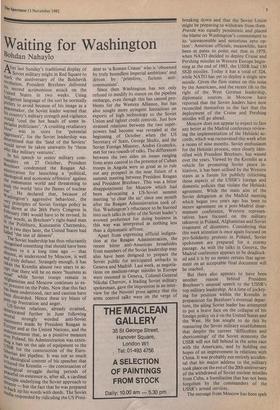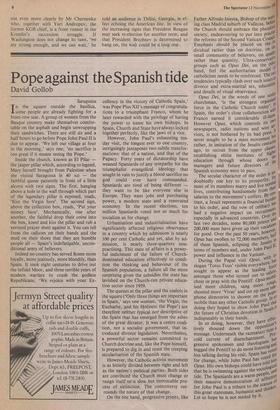Waiting for Washington
aohdan Nahaylo
Ater last Sunday's traditional display of Soviet military might in Red Square to mark the anniversary of the Bolshevik revolution, President Brezhnev delivered ,.111s second acrimonious attack on the United States in two weeks. Using belligerent language of the sort he normally „lprefers to avoid because of his image as a acemaker, the Soviet leader warned that "Is country's military strength and vigilance Would 'cool the hot heads of some in- brialist politicians'. 'A crushing retaliatory plow, was in store for 'potential aggressors', for the Soviet leadership was determined that the 'land of the Soviets' would never be taken unawares by 'those who like military ventures'. rn1n his speech to senior military com- manders on 27 October, President Brezhnev condemned the Reagan Ad- ministration for launching a 'political, ideological and economic offensive' against he communist world and threatening to Push the world 'into the flames of nuclear War'. He declared that, because of Washington's aggressive behaviour, the e.rY principles of Soviet foreign policy as ;Id down at the 26th Party Congress in ebruary 1981 would have to be revised. In other words, as Brezhnev's right-hand man the Politburo, Konstantin Chernenko, i
Put
,„- it two days later, the United States had cued the test of détente'. r The Soviet leadership has thus reluctantly e,eugnised something that should have been oo. vious to it a long time ago — that d aLtente, as understood by Moscow, is well taken truly defunct. Strangely enough, it has ceps the Kremlin almost two years to ac- `ePt that there will be no more 'business as usual' while Soviet troops remain in ;'gbanistan and Moscow continues to ex- b`rt Pressure on the Poles. Now that this fact as been understood, tact and caution have peen discarded. Hence these icy blasts of e1t-up frustration and anger. BuS-Soviet relations, already strained, `a_ eteriorated further in June following eyer strongly worded anti-Soviet Europe made by President Reagan in an"ruPe and at the United Nations, and the Cvnc)uncement that, as a punitive measure d.fr Poland, his Administration was exten- ;,4 a ban on the sale of equipment to the si'bSR. for the construction of the Euro- tb e.rlan gas pipeline. It was not so much ideological content of his speeches that i'dritated the Kremlin — the continuation of p:°1°gical struggle during periods of or-aceful co-existence is, after all, a cardinal 41,4cIPle underlying the Soviet approach to tc;shente — but the fact that he was prepared "ack up his words with deeds. The Soviet echa responded by ridiculing the US Presi- dent as 'a Roman Ceasar' who is 'obssessed by truly boundless imperial ambitions' and driven by 'primitive, furious anti- communism'. Since then Washington has not only refused to modify its stance on the pipeline embargo, even though this has caused pro- blems for the Western Alliance, but has also sought more stringent limitations on exports of high technology to the Soviet Union and tighter credit controls. Just how strained relations between the two super- powers had become was revealed at the beginning of. October when the US Secretary of State, George Shultz, and the Soviet Foreign Minister, Andrei Gromyko, met for two rounds of talks. The differences between the two sides on issues ranging from arms control to the presence of Cuban troops in Angola were so great as to rule out any prospect in the near future of a summit meeting between President Reagan and President Brezhnev. This was a bitter disappointment for Moscow which had been advocating a US-Soviet summit meeting `to clear the air' since one month after the Reagan Administration took of- fice. Washington's reluctance to be hurried into such talks in spite of the Soviet leader's avowed preference for doing business in this way was interpreted as nothing less than a diplomatic affront. Apart from expressing official indigna- tion at the Reagan Administration, the recent bitter anti-American broadsides from members of the Soviet leadership may also have been designed to prepare the Soviet public for anticipated setbacks in Geneva and Madrid. Last week, as negotia- tions on medium-range missiles in Europe were resumed in Geneva, Colonel-General Nikolai Chervov, a leading Soviet military spokesman, gave the impression in an inter- view for the Novosti press agency that the arms control talks were on the verge of
breaking down and that the Soviet Union might be preparing to withdraw from them.
Pravda was equally pessimistic and placed the blame on Washington's commitment to its 'unreasonable and notorious zero op- tion'. American officials, meanwhile, have been at pains to point out that in 1979, when NATO decided to deploy Cruise and Pershing missiles in Western Europe begin- ning at the end of 1983, the USSR had 130 SS20 missiles. Today it has a total of 324, while NATO has yet to deploy a single new missile. Given the firm stance on this issue by the Americans, and the recent tilt to the right of the West German leadership, diplomatic sources in Moscow have reported that the Soviet leaders have now reconciled themselves to the fact that the deployment of the Cruise and Pershing missiles will go ahead.
Moscow does not appear to expect to fare any better at the Madrid conference review- ing the implementation of the Helsinki ac- cords, which was reconvened this week after a recess of nine months. Soviet enthusiasm for the Helsinki process, once closely iden- tified with President Brezhnev, has waned over the years. Viewed by the Kremlin as a vehicle for promoting Soviet peace in- itiatives, it has been utilised by the Western states as a forum for publicly criticising those aspects of the USSR's foreign and domestic policies that violate the Helsinki agreement. While the main aim of the Soviet delegation at the Madrid meeting which began two years ago has been to secure agreement on a post-Madrid disar- mament conference, Western represen- tatives have focused on the military takeover in Poland, Afghanistan and Soviet treatment of dissenters. Considering that this week attention is once again focused on pro-Solidarity protests in Poland, Soviet spokesmen are prepared for a stormy passage. As with the talks in Geneva, the Madrid conference appears to be deadlock- ed and it is by no means certain that agree- ment on an acceptable final document will be reached.
But there also appears to have been another reason behind President Brezhnev's unusual speech to the USSR's top military leadership. At a time of jockey- ing for position within the Kremlin in preparation for Brezhnev's eventual depar- ture, the ailing Soviet leader has attempted to put a brave face on the collapse of his foreign policy vis a vis the United States and the West. He has sought to do this by reassuring the Soviet military establishment that despite the current 'difficulties and shortcomings' of the Soviet economy the USSR will not fall behind in the arms race with the Americans, and by holding out hopes of an improvement in relations with China. It was probably not entirely acciden- tal that his major address to the, military took place on the eve of the 20th anniversary of the withdrawal of Soviet nuclear missiles from Cuba, a humiliation that has not been forgotten by the commanders of the USSR's armed services.
The message from Moscow has been spelt
out even more clearly by Mr Chernenko who, together with Yuri Andropov, the former KGB chief, is a front runner in the Kremlin's succession struggle. If Washington does not change its tune, 'we are strong enough, and we can wait,' he told an audience in Tbilisi, Georgia, in ef- fect echoing the American line. In view of the increasing signs that President Reagan may seek re-election for another term, and that President Brezhnev is determined to hang on, the wait could be a long one.















































 Previous page
Previous page